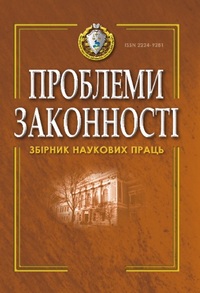Загальні принципи права на свободу думки, совісті та релігії відповідно до рішення «С.А.С. проти Франції» Європейського суду з прав людини
General principles of the right for the freedom of thought, conscience and religion according to “S. A. S. v. France” decision of the European Court of Human Rights
Author(s): Vitaly SorokunSubject(s): Philosophy, Law, Constitution, Jurisprudence, International Law
Published by: Національний юридичний університет імені Ярослава Мудрого
Keywords: freedom of conscience and religion; democratic society; international standards of the right for the freedom of conscience and religion; European Court of Human Rights; limitations of the freedom of.
Summary/Abstract: International standards of the right for the freedom of thought, conscience and religion as well as the corresponding case law of the European Court of Human Rights have not been sufficiently studied in the Ukrainian science of international public law. Contemporary researchers should have a clear understanding of what exactly comprises the catalog of international standards of this right, and how such standards are interpreted by the European Court. The Court in its 2014 decision S. A. S. v. France drew such a catalogue in a unique way. It is therefore important to analyze it for understanding and implementing this right. The understanding of standards of the right for the freedom of conscience and religion is not static. It is constantly developed by the case law of the European Court of Human Rights. The Court’s decision S. A. S. v. France is one of the most recent and, perhaps, most controversial decisions on Article 9 of the European Convention on Human Rights, in which the Court drew a catalogue of such standards and gave its interpretation. The analysis of the most recent case law of the Court determines the actuality of this study. The purpose of the article is to make an analysis of the main standards of the right for the freedom of thought, conscience and religion in their interpretation by the European Court in its 2014 decision S. A. S. v. France. The article analyzes nine key standards of the right for the freedom of thought, conscience and religion as outlined in S. A. S. v. France decision. These are the principles that the Court examines each time while considering applications for violations of Article 9. From a researcher’s point of view S. A. S. v. France decision is both interesting and helpful, because here the Court dedicated a special section to the key principles which it had drawn in its previous case law. The difficulty and a controversial character of the decision prompted the Court to make a compilation of its former case law in order to justify its position. This make the decision extremely helpful to the researcher because it became a certain general commentary created by the Court, and which will be referred to as to the main list of rules and principles used by the Court in many years to come.
Journal: Проблеми законності
- Issue Year: 2016
- Issue No: 132
- Page Range: 186-196
- Page Count: 11
- Language: Ukrainian

